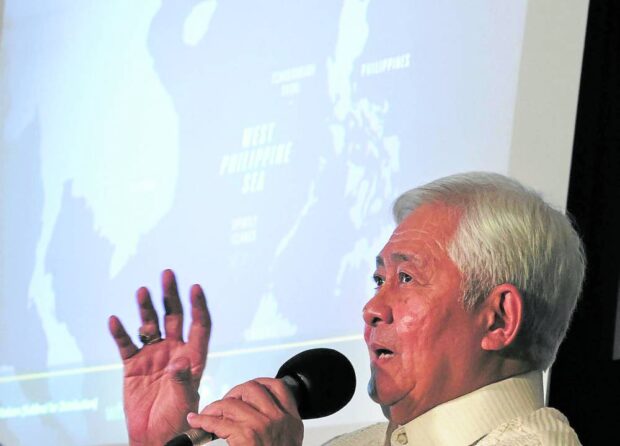
Retired Supreme Court Associate Justice Francis Jardaleza. (File photo by MARIANNE BERMUDEZ / Philippine Daily Inquirer)
MANILA, Philippines — The government should consider filing another arbitration case to assert the country’s sovereign rights in the West Philippine Sea (WPS) in the face of Beijing’s refusal to acknowledge the historic 2016 arbitral ruling in favor of Manila, former Solicitor General and Supreme Court Associate Justice Francis Jardeleza said on Wednesday.
Jardeleza acknowledged, however, that any legal move by the Philippines should have the imprimatur of President Ferdinand Marcos Jr., the chief architect of the country’s foreign policy.
“Under all circumstances, another [case should be filed] before another ad-hoc tribunal constituted under the Unclos (United Nations Convention on the Law of the Sea) or perhaps the International Tribunal for the Law of the Sea, but managed solely by the Office of the Solicitor General of the Philippines, without the heavy cost of hiring foreign counsel,” said Jardeleza.
Jardeleza had led the victorious Philippine legal team to the Permanent Court of Arbitration in The Hague, Netherlands.
During a forum, the retired justice called on Marcos to solicit recommendations from relevant government agencies to implement a clear and holistic policy on the West Philippine Sea.
On Wednesday, Malacañang was silent on the seventh anniversary of Manila’s legal victory over Beijing. President Marcos also did not release any statement.
But the Department of Foreign Affairs launched a microsite on the arbitral award.
“The website is in partial fulfillment of the DFA’s commitment to promote better understanding of the 2016 Arbitral Award as a Philippine contribution to the peaceful settlement of disputes through international law,” said Foreign Secretary Enrique Manalo.
Some observers noted on social media that the microsite excluded mention of the role of the late former President Benigno Aquino III, whose administration had pursued the Hague case.
In 2013, under Aquino, the Philippine government took China to the Hague arbitration body to challenge Beijing’s “nine-dash line” claims over practically all of the South China Sea, including the West Philippine Sea, or the waters within Manila’s 370-kilometer exclusive economic zone (EEZ).
The Filipinos argued that China’s claims did not conform to the Unclos.
On July 12, 2016, the Hague tribunal issued a unanimous decision that invalidated China’s sweeping claims and recognized the Philippines’ sovereign right to fish and explore resources within its EEZ.
China has consistently refused to recognize the ruling.
During a meeting with Filipino reporters in Beijing last month, the ministry insisted that the issue must be resolved bilaterally with the Philippines.
China’s veto power
At Wednesday’s forum, Jardeleza also suggested elevating the case to the United Nations, even as he expressed concern about China’s veto powers as a permanent member of the UN Security Council.
“If we go to the UN, we have to contend with the veto power of China in the UN Security Council. While we can go to the UN General Assembly to debate China’s action and possibly get majority support or vote, this would still not be binding as far as China is concerned,” he said.
On the other hand, another retired magistrate, former Senior Associate Justice Antonio Carpio, warned that the Philippines could experience an energy crisis should it fail to develop gas-rich Recto (Reed) Bank in the West Philippine Sea, as it was the “only replacement for Malampaya,” once the latter’s reserves had run out.
In a chance interview, Carpio said Manila’s dispute with Beijing over the West Philippine Sea would have far-reaching economic repercussions, as Recto Bank was the country’s only natural alternative to the diminishing gas deposits of the Malampaya gas field.
“Without Malampaya, we will have 12 to 14 hours of daily brownouts; businesses, factories, schools will close; you cannot work from home because there is no power. It’s worse than the pandemic,” he said.
Malampaya’s reserves are expected to significantly decrease by 2024 and completely run out by 2027.
Carpio said the arbitral award was not just a matter of affirming the country’s sovereign rights in the disputed waters but also upholding the country’s legal right to exploit resources within its EEZ.
That, he said, includes Recto Bank.
According to a 2013 report by the United States Energy Information Administration, Recto Bank may have up to 5.4 billion barrels of oil and 55.1 trillion cubic meters of natural gas.
China, however, claims economic rights to the area as part of its nine-dash line.
Deterrent forces
Carpio said the Philippines could follow the examples of its Southeast neighbors like Malaysia, which had already explored its gas reserves with the help of US and Australian navies that deterred Chinese militia vessels from interfering.
“Indonesia did the same thing, and at the same time, the US aircraft carrier Ronald Reagan was pretending to pass by and the Chinese couldn’t do anything. And that’s the solution, we don’t have to invent the wheel,” he said.
Carpio said the Philippines must stand its ground along with its allies and fellow Southeast Asian claimants such as Brunei, Malaysia, Vietnam, and Indonesia.
“Otherwise, China can pick them off one by one,” Carpio said.